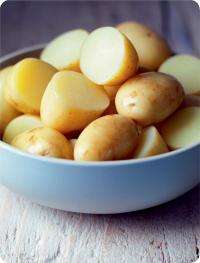Research shows how 'green' our food is

New research from Cranfield University has analysed how 'green' some of our everyday food choices are, and their long term sustainability for UK diets.
The team of scientists compared three types of carbohydrates commonly eaten in Great Britain – British grown potatoes, Italian pasta and Indian basmati rice – for greenhouse gas emissions (GHGE) and water use. The research looked at the three foodstuffs, from the farm through to delivery to the retailer.
Basmati rice came in third place with the highest GHGEs and the biggest impact on water use, showing up to 100 times the potential impact on water compared to potatoes or pasta. This mainly results from the irrigation water needed for paddy fields. Pasta and potatoes are almost equal, with roughly the same amount of water used and GHGEs emitted. Potatoes just manage to have the edge because of typical portion size, but all three foodstuffs have different densities of macro and micronutrients, such as energy and vitamins.
Dr Adrian Williams, Cranfield University's lead researcher on the project, said: "We are excited about these results as they go a step further in measuring the environmental 'goodness' of food. Some studies only look at greenhouse gas emissions or water footprints. Our study combines a range of assessments to give a clearer picture of the environmental impact of food."
He added: "Because consumer preparation and cooking of these foods differs this affects the overall environmental impact. However, we hope that this method can be used to assess the relative impacts of other foods, so that we can move towards not just a healthier, but also greener diet."
More information: www.potato.org.uk/news/sustain … -debate-win-potatoes
Provided by Cranfield University
















